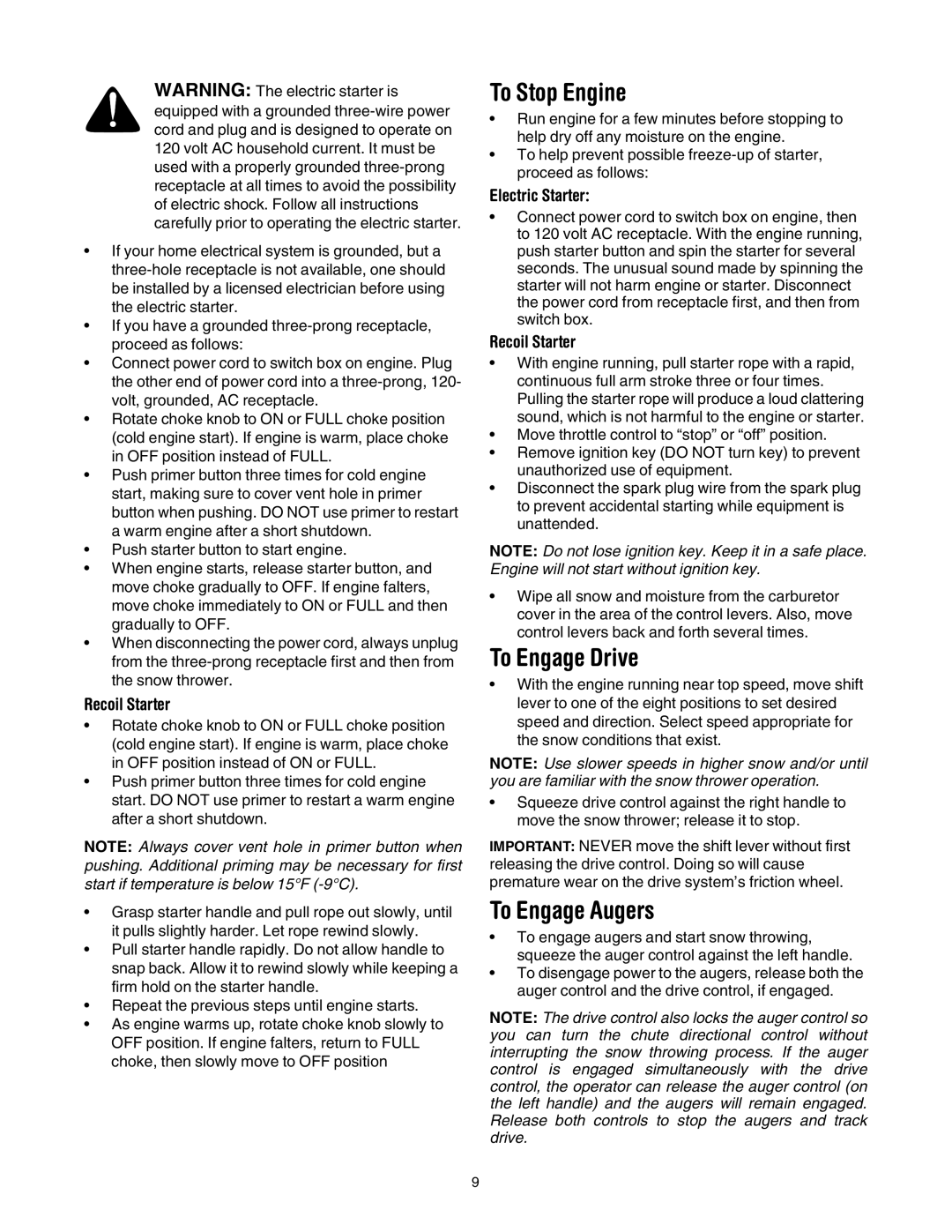WARNING: The electric starter is equipped with a grounded
•If your home electrical system is grounded, but a
•If you have a grounded
•Connect power cord to switch box on engine. Plug the other end of power cord into a
•Rotate choke knob to ON or FULL choke position (cold engine start). If engine is warm, place choke in OFF position instead of FULL.
•Push primer button three times for cold engine start, making sure to cover vent hole in primer button when pushing. DO NOT use primer to restart a warm engine after a short shutdown.
•Push starter button to start engine.
•When engine starts, release starter button, and move choke gradually to OFF. If engine falters, move choke immediately to ON or FULL and then gradually to OFF.
•When disconnecting the power cord, always unplug from the
Recoil Starter
•Rotate choke knob to ON or FULL choke position (cold engine start). If engine is warm, place choke in OFF position instead of ON or FULL.
•Push primer button three times for cold engine start. DO NOT use primer to restart a warm engine after a short shutdown.
NOTE: Always cover vent hole in primer button when pushing. Additional priming may be necessary for first start if temperature is below 15°F
•Grasp starter handle and pull rope out slowly, until it pulls slightly harder. Let rope rewind slowly.
•Pull starter handle rapidly. Do not allow handle to snap back. Allow it to rewind slowly while keeping a firm hold on the starter handle.
•Repeat the previous steps until engine starts.
•As engine warms up, rotate choke knob slowly to OFF position. If engine falters, return to FULL choke, then slowly move to OFF position
To Stop Engine
•Run engine for a few minutes before stopping to help dry off any moisture on the engine.
•To help prevent possible
Electric Starter:
•Connect power cord to switch box on engine, then to 120 volt AC receptacle. With the engine running, push starter button and spin the starter for several seconds. The unusual sound made by spinning the starter will not harm engine or starter. Disconnect the power cord from receptacle first, and then from switch box.
Recoil Starter
•With engine running, pull starter rope with a rapid, continuous full arm stroke three or four times. Pulling the starter rope will produce a loud clattering sound, which is not harmful to the engine or starter.
•Move throttle control to “stop” or “off” position.
•Remove ignition key (DO NOT turn key) to prevent unauthorized use of equipment.
•Disconnect the spark plug wire from the spark plug to prevent accidental starting while equipment is unattended.
NOTE: Do not lose ignition key. Keep it in a safe place. Engine will not start without ignition key.
•Wipe all snow and moisture from the carburetor cover in the area of the control levers. Also, move control levers back and forth several times.
To Engage Drive
•With the engine running near top speed, move shift lever to one of the eight positions to set desired speed and direction. Select speed appropriate for the snow conditions that exist.
NOTE: Use slower speeds in higher snow and/or until you are familiar with the snow thrower operation.
•Squeeze drive control against the right handle to move the snow thrower; release it to stop.
IMPORTANT: NEVER move the shift lever without first releasing the drive control. Doing so will cause premature wear on the drive system’s friction wheel.
To Engage Augers
•To engage augers and start snow throwing, squeeze the auger control against the left handle.
•To disengage power to the augers, release both the auger control and the drive control, if engaged.
NOTE: The drive control also locks the auger control so you can turn the chute directional control without interrupting the snow throwing process. If the auger control is engaged simultaneously with the drive control, the operator can release the auger control (on the left handle) and the augers will remain engaged. Release both controls to stop the augers and track drive.
9
